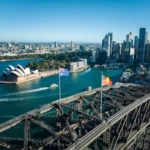A Canadian Visitor Visa, commonly known as a Temporary Resident Visa (TRV), is an official document issued by a Canadian visa office to persons who are not Canadian citizens or permanent residents of Canada and are legally authorized to enter Canada for a holiday (vacation), visit family or conduct business for up to 6 months in Canada. This document is affixed to your passport as a visitor and non-Canadian citizen to indicate that you have fulfilled the criteria for entry into Canada as a temporary resident.
Are you dreaming of visiting your loved ones or exploring the stunning scenery, iconic sites, historic landmarks, fine Canadian cuisine, lively urban areas, endless opportunities, and warm hospitality that Canada offers? Then, you need a Canadian Visitor Visa or an Electronic Travel Authorization (eTA) to make your travel dreams a reality. In this article, we’ll walk you through the straightforward steps of applying for a Canadian visitor visa; from determining your eligibility to obtaining your visitor visa, we’ll address every step to ensure you are well-prepared for a seamless and hassle-free application!
Step #1: Determine your eligibility
Specific individuals are deemed inadmissible to Canada, indicating they cannot enter the country. Multiple factors can render someone inadmissible, such as participation in criminal conduct, violations of human rights, and organized criminal activities. Some people may also be prohibited from entering Canada for security, health, or financial issues, so to obtain a visitor visa, you need to meet some basic requirements, which include:
- Having a valid travel document, like a passport
- Being in good health
- Having no criminal or immigration-related convictions
- Convincing an immigration officer that you have ties such as a job, home, financial assets, or family will motivate you to go back to your home country.
- Convincing an immigration officer that you plan to leave Canada after your visit ends
- Ensuring you have sufficient funds for your visit
- Having a medical examination and an invitation letter from a resident of Canada
- Familiarize yourself with the necessary steps if your minor children (those younger than 18) will travel with you, with another adult, or independently.
Step #2: Gather all required documents
The purpose of your visit to Canada influences your application process and the required documents for your visa submission. Below is a list of documents you need to apply for a Canadian Visitor Visa based on your situation.
For Tourism
If you plan to visit Canada as a Tourist, you need documents that show your identity, such as:
- Passports (regular, official, or diplomatic) from most countries (see exceptions below)
- Alien’s passport for stateless persons
- US Permit to Re-Enter (Form I-327)
- US Refugee Travel Document (Form I-571)
- Other refugee travel documents for non-citizens
The document should include a clear, colored copy of your valid passport or travel document. Additionally, you need to provide a copy of the page that displays your date of birth and country of origin and any pages containing stamps, visas, or markings. A government authority must issue all travel documents, including your name, date of birth, document number, citizenship or residency status, photo, and expiry date (if applicable). Please note that passports from Somalia, non-machine-readable passports from the Czech Republic, temporary passports from the Republic of South Africa, and provisional passports from Venezuela are unacceptable.
Other additional documents include documents showing:
- Your travel history
- Your intended length of stay and activities you want to engage in while in Canada
- Your bank account statement
For a Family Visit
If you plan to travel to Canada to visit a family who is a Canadian citizen, a person registered under Canada’s Indian Act, or a Canadian permanent resident, then you need documents that can serve as proof of your relationship with the family member inviting you to Canada which might include a copy of:
- A marriage certificate
- Statutory Declaration of Common-Law Union (IMM5409)
- A birth certificate
- An official document naming you as a parent
Aside from these documents, you also need additional documents that show your identity, such as:
- Passports (regular, official, or diplomatic) from most countries (see exceptions below)
- Alien’s passport for stateless persons
- US Permit to Re-Enter (Form I-327)
- US Refugee Travel Document (Form I-571)
- Other refugee travel documents for non-citizens
The document should include a clear, colored copy of your valid passport or travel document. Additionally, you need to provide a copy of the page that displays your date of birth and country of origin and any pages containing stamps, visas, or markings. Note that a government authority must issue all travel documents, including your name, date of birth, document number, citizenship or residency status, photo, and expiry date (if applicable). Please note that passports from Somalia, non-machine-readable passports from the Czech Republic, temporary passports from the Republic of South Africa, and provisional passports from Venezuela are unacceptable.
Other additional documents include documents showing:
- A letter of invitation written by your family member in Canada
- Your travel history
- Your intended length of stay and activities you want to engage in while in Canada
- Your bank account statement
- A letter from your employer that shows you have a stable job and will return to it. It can also show that your employer supports your visit to Canada.
For Business
If you plan to visit Canada for business, you need documents that show your identity, such as:
- Passports (regular, official, or diplomatic) from most countries (see exceptions below)
- Alien’s passport for stateless persons
- US Permit to Re-Enter (Form I-327)
- US Refugee Travel Document (Form I-571)
- Other refugee travel documents for non-citizens
The document should include a clear, colored copy of your valid passport or travel document. Additionally, you need to provide a copy of the page that displays your date of birth and country of origin and any pages containing stamps, visas, or markings. A government authority must issue all travel documents, including your name, date of birth, document number, citizenship or residency status, photo, and expiry date (if applicable). Please note that passports from Somalia, non-machine-readable passports from the Czech Republic, temporary passports from the Republic of South Africa, and provisional passports from Venezuela are unacceptable.
Other additional documents include documents showing:
- Your travel history
- Your intended length of stay and activities you want to engage in while in Canada
- Your bank account statement
- A letter from your employer that shows you have a stable job and will return to it. It can also show that your employer supports your visit to Canada.
- A Letter of invitation from a business or company in Canada
For a Visit to your Spouse or Partner who has Sponsored you for Permanent Residence
If you plan to visit your partner or spouse who has sponsored you for permanent residence, then you need documents that can serve as proof of your relationship with the person inviting you to Canada, which might include a copy of the following:
- A marriage certificate
- Statutory Declaration of Common-Law Union (IMM5409)
- A birth certificate
- An official document naming you as a parent
Aside from these documents, you also need additional documents that show your identity, such as:
- Passports (regular, official, or diplomatic) from most countries (see exceptions below)
- Alien’s passport for stateless persons
- US Permit to Re-Enter (Form I-327)
- US Refugee Travel Document (Form I-571)
- Other refugee travel documents for non-citizens
The document should include a clear, colored copy of your valid passport or travel document. Additionally, you need to provide a copy of the page that displays your date of birth and country of origin and any pages containing stamps, visas, or markings. A government authority must issue all travel documents, including your name, date of birth, document number, citizenship or residency status, photo, and expiry date (if applicable). Please note that passports from Somalia, non-machine-readable passports from the Czech Republic, temporary passports from the Republic of South Africa, and provisional passports from Venezuela are unacceptable.
Other additional documents include documents showing:
- A letter of invitation written by your family member in Canada
- Your travel history
- Your intended length of stay and activities you want to engage in while in Canada
- Your bank account statement
- A letter from your employer that shows you have a stable job and will return to it. It can also show that your employer supports your visit to Canada.
Step #3: Start your Application
There are two methods to apply for a visitor visa to Canada, you can apply:
- Online through the IRCC portal or
- Through a paper application, if you can’t apply online due to a disability or you’re traveling with an identity or travel document that was issued to a refugee, a stateless individual, or a non-citizen
If you choose to apply online, you’ll need an invite code before creating an account via the IRCC portal and signing in. Once you’ve signed in, complete the online application form, upload all scanned copies of your documents supporting your visa application, and pay the application fee of $100 CAD with your credit card or prepaid card. You may need to give your biometrics in person and also pay the biometrics fee of $85 CAD when you apply to avoid delays. The biometrics fee covers the cost of collecting fingerprints and a digital photo. Note that If you’re a lawful permanent resident of the U.S. with a valid green card, you don’t need to give biometrics only to visit Canada. Click here to check if you need to give your biometrics.
After you pay the biometric fee, you’ll get a biometric instruction letter (BIL) that:
- Verifies that you are required to provide your biometrics
- Tells you how to book a biometrics appointment
Once your application has been submitted, it will be reviewed to ensure you have all the necessary documents. If your documents are incomplete, your application may be refused. Aside from this, you might be asked to:
- Go to an interview with Canadian officials in your country to
- Send more information
- Get a medical exam
- Get a police certificate
Most applications are processed in a few weeks or less. Processing times depend on the visa office and whether you need to take any extra steps (listed above).
Step #4: Check your application status
Checking your application status varies based on how you applied. Once your application has been approved, you’ll get two letters in your IRCC account, including a letter with instructions on submitting your passport and a decision letter. Read more about preparing for your arrival in Canada.


